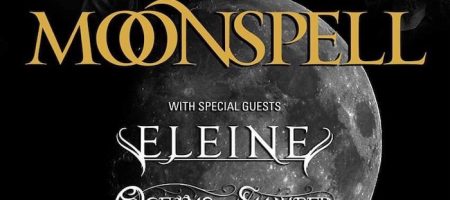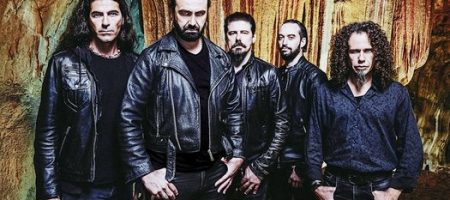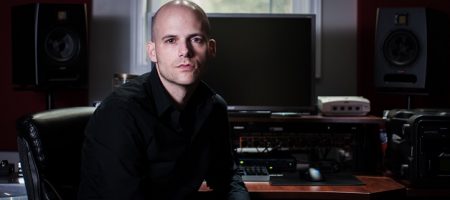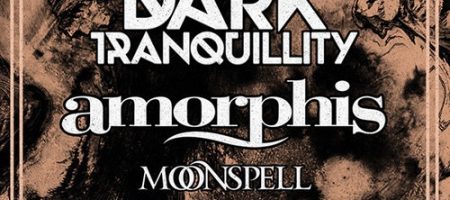Moonspell – Legacy of Sin
Sunday, 8th December 2019
Moonspell hit it big when they first began, releasing Wolfheart and Irreligious to a very receptive crowd and erupting themselves into the ‘90s metal scene. As the ‘90s progressed, many bands sought to change things up and experiment with their sound and Moonspell was among those acts. With their 2econd Skin EP and Sin/Pecado follow-ups, they shifted further into gothic (and electronic territory) and it caused a bit of an uproar from those expecting more of the same.
A bit underappreciated at the time, the tide turned more over the years (as is the case with more experimental releases) and now in 2019, we see the beginning of a series of reissues from Moonspell’s early Century Media catalog now getting a new release, starting with Sin/Pecado (purchase HERE), through Napalm Records. So it seemed a fine opportunity to chat with vocalist Fernando Ribeiro about his recollections of the time, as well as a look back through some of the band’s extensive legacy.
Dead Rhetoric: What sparked the idea to re-release Sin/Pecado along with 2econd Skin?
Fernando Ribeiro: Everybody is like, “oh, you guys are trying to tap into the nostalgia market,” which to me is not a bad thing. I think a musician needs all of the weapons they can get to fight the crisis of the record industry. People are very opinionated, but normally, they don’t know shit [laughs]. The fact is that we started this band in Portugal, by ourselves, and we came to the conclusion that it was much needed to bring back the old repertoire because it was totally sold out. Some people and collectors, and newer fans were trying to get the material and it turned out to be very expensive for them.
So we reached to Century Media and we started out with Wolfheart and Irreligious, and it was very successful. Then in collaboration with Napalm Records, we sent emails around. We got involved, and I think it’s very important for the bands to get involved with re-issues. We started off with Sin/Pecado, which was a great divider for fans – not everybody loves it. Back then, it seemed like everyone hated it [laughs]. People are very excited about it. But this is not a one-off, we are going to do Sin/Pecado upto The Antidote, so our Century Media years will be available really soon.
Dead Rhetoric: What do you remember about the time period when you were releasing Sin/Pecado?
Ribeiro: I think that was the last year in heavy metal music where people [didn’t] have the patience for bands experimenting. Twenty years later, I’m happy to see more experimental bands like Zeal & Ardor, Ulver, and Leprous are getting really big and famous. I wouldn’t say that Sin/Pecado was ahead of it’s time or underrated – that would be an overstatement in my opinion, but I think that not only us, but Paradise Lost, My Dying Bride, and Tiamat – we were in a musical path that really involved experimentation and messing with the fans heads with the boundaries of dark metal. Some people really dug it, and took it to heart, but there was also a countermovement leading to these bands. It’s just a name – I have no opinion about it. But for instance, bands like Hammerfall, were the forerunners of a certain type of ‘classic,’ let’s call it, metal. So there was a division in the waters.
If you ask me as a musician, I have no regrets about Sin. I would like to re-record it because I wasn’t happy with the production, and I think some of those ideas were lost in translation. In a way, that’s why we got a different producer for The Butterfly Effect. But if people know about metal history, they should know that the main Moonspell influences of Bathory and Celtic Frost, they were experimental bands as well. We kind of didn’t invent anything new, we just followed the lead and extended our wavelength to what we thought our idols would have done. Quorthon (of Bathory) actually wrote Under the Sign of the Black Mark as well as Twilight of the Gods. Celtic Frost wrote Into the Pandemonium as well as Morbid Tales. So I think that we followed that path. But you can never control what people think. That’s the beauty and the curse of being a musician. We just moved on, and we are still here.
People needed time to appreciate Sin, so I don’t mind. We were coming from a very glorious time with Wolfheart and Irreligious, and we got kicked in the head a little bit. But if I didn’t want to be kicked in the head, I wouldn’t be a musician [laughs]. I don’t want to…but I can definitely deal with it. Then some things grow on you – when I listened to Hammerheart from Bathory, I said, “What the fuck is this?” but after a few days I loved it. When someone you love makes something you don’t like, it’s not a reason to get them out of your life…and music imitates life.
Dead Rhetoric: As you were mentioning, around this time period there was a lot of experimentation going on right at that point. It was almost like it was something that shouldn’t have been a surprise. You mentioned a few, and I can instantly recall Dark Tranquillity’s Projector as well.
Ribeiro: Yeah, yeah…great album. People started to blame Century Media at the time. No, if anything they wanted more old fashioned art like Irreligious. It was totally our decision. Nowadays, you have to see that there are bands and products. Back then, there was just bands. We didn’t know about social networking, so we thought we were doing a good thing and following our hearts and musical leads. But in ’98 and ’99 became the period where fans wanted to order the music like you ordered pizza: more pepperoni, more onions, or no cheese.
It was a beauty time, but hard times as well for many bands, because we didn’t want praise. We were not thinking about the consequences. Nowadays, bands do think about the consequences. It’s always difficult to speak about the majority of fans, but many people in metal enjoy the comfort zone. Some people don’t. We relate more to the latter and so do our fans. If you ask me, there’s space for everyone. It’s useless to fight, and campaign against bands. I’m 45, and I’m so tired of that shit. I want fans, not customers. That’s what I feel about Moonspell.
Dead Rhetoric: Are there any lessons that you felt the band learned from a record like Sin/Pecado?
Ribeiro: Many lessons – I think that we learned how people can be cynical, and how they need their time to appreciate bands. I think music is a mixture between glory and humiliation. A healthy minded musician has to learn how to move in the grey area. I express myself, and I pay the price for musical freedom. That’s a lesson that I definitely learned after we wrote Sin. There are many, many people that think Moonspell is Wolfheart and Irreligious. But it seems that there are also many people that don’t think that, and we are still in business. I think that there’s a powerful force that we have to consider. People that aren’t so concerned about living only in the past.
Dead Rhetoric: What do you feel that Moonspell’s legacy is, now with over 25 years under your belts?
Ribeiro: That’s tough, because in 25 years and now coming closer to 30…it might seem like a long time, but it also feels like a blink of an eye. I think the main concern, in the last few years of our career, because we aren’t going to make another 25 years, is really to have quality and vision, and to involve our fans with the atmosphere that we always wanted to provide in the beginning. Now we can provide it a little bit better with our experience. In 25 years, one thing I have to say is that Moonspell is still pretty much the same elements. Myself, Ricardo [Amorim], Pedro [Paixão], and Mike [Gaspar] have been together since 1995.
Whenever I get in the tour bus, I have to meet all the new members of all the other bands. “Is that your new guitar player?” Only the singer sometimes is there. I think that’s sad. Music is great, and touring is great, but we should have some values as well: friendship, brotherhood, and not overvalue success or our thirst for success over people that we started the band with. Obviously we have our problems, but in our 25 years seeing bands without an original member is sad. I have a hard time respecting that.
Dead Rhetoric: So having that core of people that have stuck around, does that help in being comfortable with your writing?
Ribeiro: I wouldn’t have anything else. I understand that touring can mess with your head – you go to other parts of the world, such as Brazil or Japan – and you want to live there and make Skype music. That doesn’t work with Moonspell. We have family values. I’m always the guy to try proximity instead of distance. I think it influences our music, our behavior, our mindset – I wouldn’t see Moonspell in any other way. This involves having dinner and hanging out when we are not on tour. We are also now all dads and godfathers of each other’s children. I believe in proximity – with all due respect for bands that meet through Skype and maybe a month or two for touring…it just doesn’t work for us. I have given it a lot of thought and it can’t work for Moonspell.
It’s funny, because when we were touring with Dark Tranquillity, and they had a good friends of ours, Christopher Amott, with them. An amazing guitar player. He told us that we dress like a band, think like a band, and go have dinner altogether – you are a band. I said thank you, because coming from him and everything he has done for metal, it meant a lot. He knows what he is talking about because he was in a band with his brother [Arch Enemy], and now he is an amazing hired gun. He made a great point in a few very simple words, “You guys are a band.” That’s what I have to say all the time. Moonspell is a band. People can criticize us, they can love us, but inside our inner circle it is about real values in life – not church burnings and killing people. Moonspell may not be the biggest band, but we are one of the strongest line-ups in today’s metal for sure.
Dead Rhetoric: Any particularly memorable moments that come to mind with the band?
Ribeiro: I was thinking the first time we played in Oslo, Norway. Nowadays, everyone is again talking about black metal because of that stupid movie, in my opinion, Lords of Chaos. All of these things that are ugly and should not be remembered. The first time we came to Oslo was in 1995, and it was at kind of the height of the hatred towards other bands and ways/nationalities. Paradise Lost had been there one week before us and their windows were smashed on the tour bus. Everyone was afraid and nervous, even Abbath. Get well Abbath, by the way. Abbath was a bit nervous about playing in Oslo, because he was from Bergen. We went on stage, and we just had Wolfheart – you could hear a tear drop falling between the songs. For me, it was just magical – we stood our ground and played our songs. When things cooled down after a few years, we went there with Samael and Rotting Christ, and we had a sold out venue.
People praised what they hated just one year earlier. I think that’s one of our highlights. I could talk about recording in Lisboa, releasing the DVD, etc – those are very important and I don’t want to seem ungrateful. But those moments [like Oslo] are the ones that separate men from little boys. I think that gig in ’95 – I never forgot about it. The cold shoulder that we were given. But in 2019, after many years – our Oslo show together with Rotting Christ has been sold out for a few weeks.
Dead Rhetoric: Along those lines, what is your view of metal in general? What keeps you in it?
Ribeiro: Hope. I’m not a fan of by the book things – I’m not a fan of product. I think many good metal bands could change a little bit here and there, and not be such crowd-pleasers. They could have more personality, because I think they have it. Then there’s the social networking aspect, which is going the wrong way. Like what’s happening with Nergal – he’s such a cool guy and a sweet person. Now he’s pretending to be a racist and anti-Semitic to sell records. I don’t think he needs that. I don’t think it’s very cool. That aggravates me in metal. On the other hand, there’s a notion of new things – new mixtures that remind me of the ‘90s. Especially bands like Zeal & Ardor – I really like the mixture between blues and black metal. There’s some great black coming out as well like Mgla – I think the scene is very healthy but not very united.
Musicians in the ‘90s, even though they competed for the best music – it was different. For example, when The Beatles were around, they competed with The Beach Boys…for the best music, not for popularity. They couldn’t give a fuck about that. The wanted to make the best production, the longest songs, the more experimental stuff. In the ‘90s, bands like Tiamat, Samael, Moonspell, Dark Tranquillity, My Dying Bride – we were all competing with each other and stretching the borders of dark metal. Nowadays, we probably have a bunch of Kardashians. They are just competing to see who has more likes and more exposure. They are creating a fake fanbase, and I think that is very dangerous for metal. On the other hand, we have incredible bands like Gojira, who don’t give a fuck about social networking – they just play their music and it’s beautiful to watch them live and to listen to their records. For me, they are probably the best metal band around these days.
We just need to regain the balance – everything is very extreme. If you listen to black metal, you cannot listen to Moonspell, or vice versa. There wasn’t a big issue for us back then. I think the scene is better, and we know better, but we aren’t looking each other in the eyes so much as our bellies. It’s war for territory [laughs], and it’s not a great thing for the bands or the fans.
Dead Rhetoric: I know you are on the road right now, what’s going for Moonspell next year?
Ribeiro: First we have to survive this tour, which has been long and eventful. But fortunately, we have our brothers in Rotting Christ with us. Its 50 dates and we have already sold out 16, and the others have been really packed. For south European bands like us and Rotting Christ, it’s really important. Normally, you would need a Swedish or Norwegian band to get those numbers. But with all due respect, we didn’t want to go there and we took a risk. People are loving our tour because it’s a different flavor. So to survive this tour is very important. It requires a lot of focus, but on the other hand, we are putting up ideas for a new album.
So in 2020 we will be talking again, because we want to release an album. But we are going to take our time. If it’s not 2020, it will be 2021. We are kind of the nightmare for any agent or label, because we don’t like to make albums just to go on tour. I understand it, and some musicians are very forward about it, but I don’t want it for Moonspell. I keep my ambitions and expectations in check. I’m not going to be a millionaire like Metallica, but hopefully I won’t have to play live until I’m 70. People have different definitions of success, and for me, it’s to keep Moonspell interesting and fresh. Also to release a kick ass album in 2020 with a lot of different ideas – picking up from where we left, but also trying to reach new places. That’s our plan. We have our ambitions and hope to make an impact with fans. It’s been that way since Wolfheart. I don’t want a truck with my name on it, I want a good album.
Order the Sin/Pecado reissue at Napalm Records
Moonspell on Facebook




























